In Libya this week the British prepared to attack the Italian army, which had occupied the port of Bardia, while in Albania, although they now occupied about a quarter of the country, the Greek counter-offensive against the Italians was gradually slowing down. On Sunday 29 December the Luftwaffe dropped incendiary and high explosive bombs on London, killing 3,600 people and starting a firestorm that became known as “the Second Great Fire of London”.
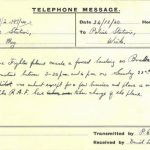 On Christmas Eve Mey Police Station recorded that, “A Hurricane Fighter plane made a forced landing on Brabster Myre, Canisbay, sometime between 3.30 p.m. and 4 p.m. on Sunday 22nd December 1940, The Pilot was unhurt except for a few bruises and plane is only slightly damaged. The R.A.F. have taken charge of the plane.”
On Christmas Eve Mey Police Station recorded that, “A Hurricane Fighter plane made a forced landing on Brabster Myre, Canisbay, sometime between 3.30 p.m. and 4 p.m. on Sunday 22nd December 1940, The Pilot was unhurt except for a few bruises and plane is only slightly damaged. The R.A.F. have taken charge of the plane.”
Also, in a very un-Christmassy spirit, the Home Guard this week proposed installing two flame 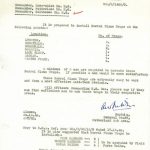 barrel traps at each of Lybster, “Berrydale” and Helmsdale. A flame barrel trap consisted of a fuel drum on top of an explosive charge. When the explosive went off it sprayed burning liquid over a wide area, and as the letter pointed out, these “are extremely easy to work and form a most effective Anti-Tank Obstacle”. It was also suggested that three more be installed at Wick Harbour, two at Thurso Harbour, and four at Bonar Bridge.
barrel traps at each of Lybster, “Berrydale” and Helmsdale. A flame barrel trap consisted of a fuel drum on top of an explosive charge. When the explosive went off it sprayed burning liquid over a wide area, and as the letter pointed out, these “are extremely easy to work and form a most effective Anti-Tank Obstacle”. It was also suggested that three more be installed at Wick Harbour, two at Thurso Harbour, and four at Bonar Bridge.
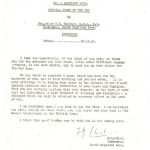 In his year end message to the Home Guard of the North Highland Area, Brigadier F.G. Chalmer wrote: “I take the opportunity, at the close of the year, to thank you for the patience you have shown, often under difficult circumstances, in the past months, and to send you my best wishes for the New Year. We are about to complete a year, which has been for the majority of you, one of hard training and patient watch. It is your privilege to be taking your share in the defence of our Island against invasion and in the protection of your homes and families … I trust that good fortune may be with you in the coming year.”
In his year end message to the Home Guard of the North Highland Area, Brigadier F.G. Chalmer wrote: “I take the opportunity, at the close of the year, to thank you for the patience you have shown, often under difficult circumstances, in the past months, and to send you my best wishes for the New Year. We are about to complete a year, which has been for the majority of you, one of hard training and patient watch. It is your privilege to be taking your share in the defence of our Island against invasion and in the protection of your homes and families … I trust that good fortune may be with you in the coming year.”
The John O’Groat Journal also had a year-end message for its readers: “Whatever this war may destroy – and it 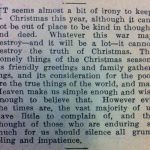 will be a lot – it cannot destroy the truth of Christmas. The homely things of the Christmas season, its friendly greetings and family gatherings, and its consideration for the poor are the true things of the world … However evil the times are, the vast majority of us have little to complain of, and the thought of those who are enduring so much for us should silence all grumbling and impatience.”
will be a lot – it cannot destroy the truth of Christmas. The homely things of the Christmas season, its friendly greetings and family gatherings, and its consideration for the poor are the true things of the world … However evil the times are, the vast majority of us have little to complain of, and the thought of those who are enduring so much for us should silence all grumbling and impatience.”
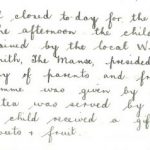 Finally this week, Dunnet School broke up for the holidays on Christmas Eve: “In the afternoon the children were entertained by the local W.R.I. [Women’s Rural Institute]. Mr Smith, The Manse, presided over a large company of parents and friends. The programme was given by the children and tea was served by W.R.I. members. Each child received a gift and a bag of sweets & fruit.”
Finally this week, Dunnet School broke up for the holidays on Christmas Eve: “In the afternoon the children were entertained by the local W.R.I. [Women’s Rural Institute]. Mr Smith, The Manse, presided over a large company of parents and friends. The programme was given by the children and tea was served by W.R.I. members. Each child received a gift and a bag of sweets & fruit.”
And so the staff of the Caithness Archive Centre wish all our visitors, researchers and readers a very happy Christmas – and at very least, a gift, and a bag of sweets and fruit!
